人教版九年级全一册 Unit 14 I remember meeting all of you in Grade 7. 课件 (共14张PPT)
文档属性
| 名称 | 人教版九年级全一册 Unit 14 I remember meeting all of you in Grade 7. 课件 (共14张PPT) | 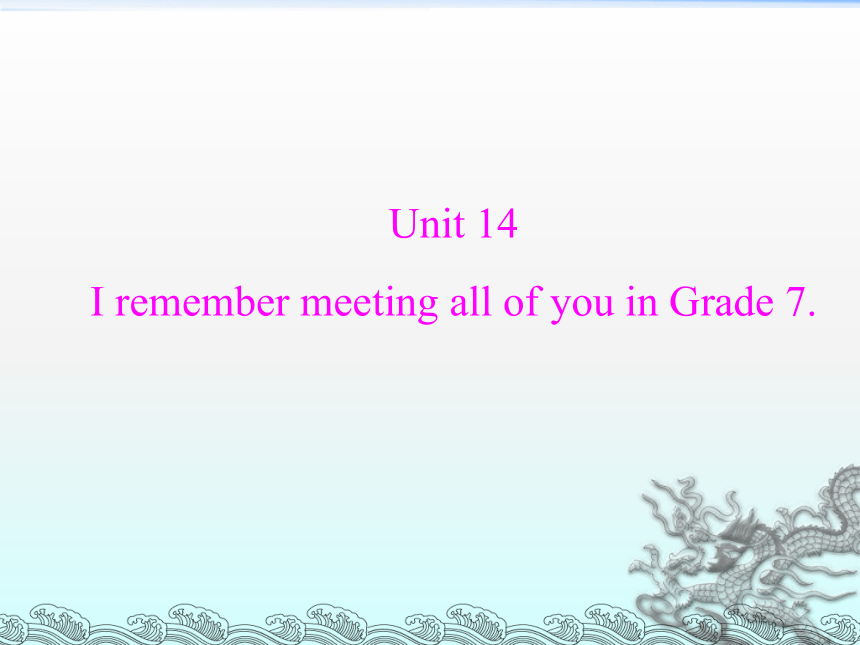 | |
| 格式 | zip | ||
| 文件大小 | 279.7KB | ||
| 资源类型 | 教案 | ||
| 版本资源 | 人教新目标(Go for it)版 | ||
| 科目 | 英语 | ||
| 更新时间 | 2023-02-03 22:47:32 | ||
图片预览

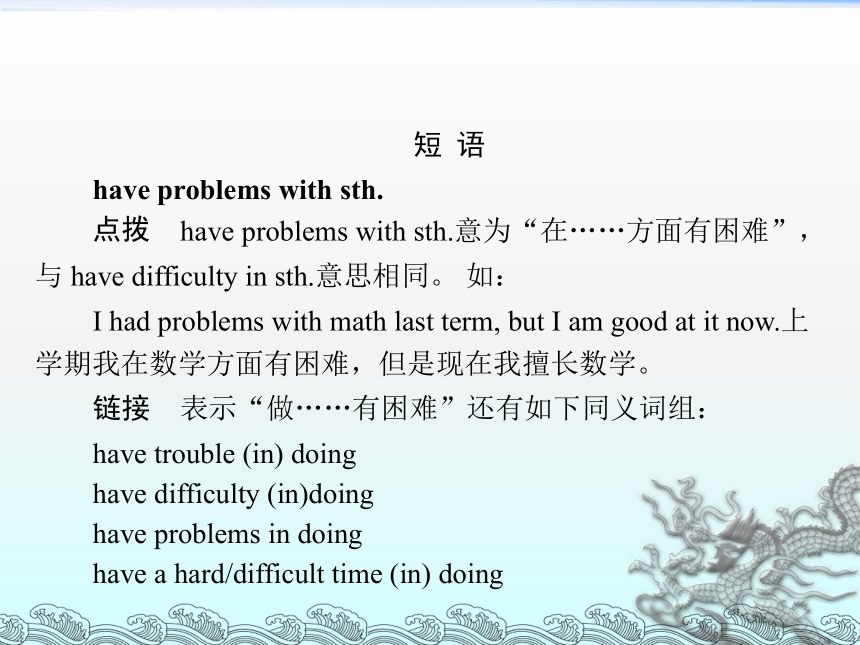
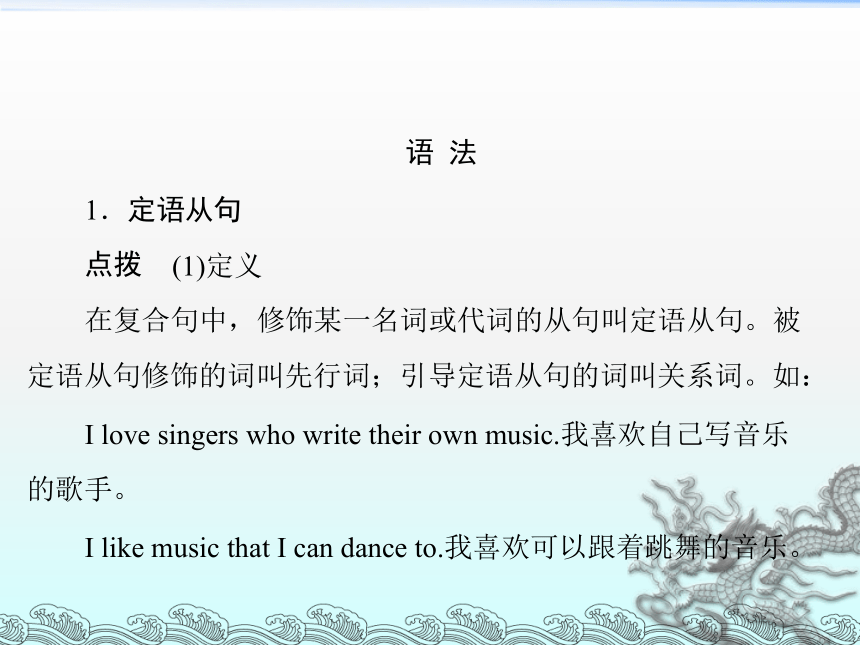
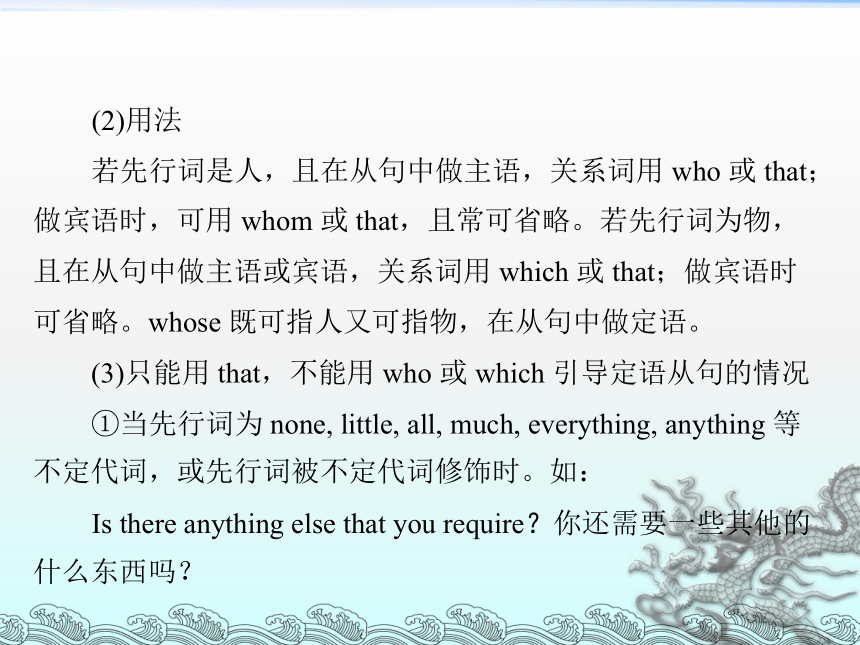
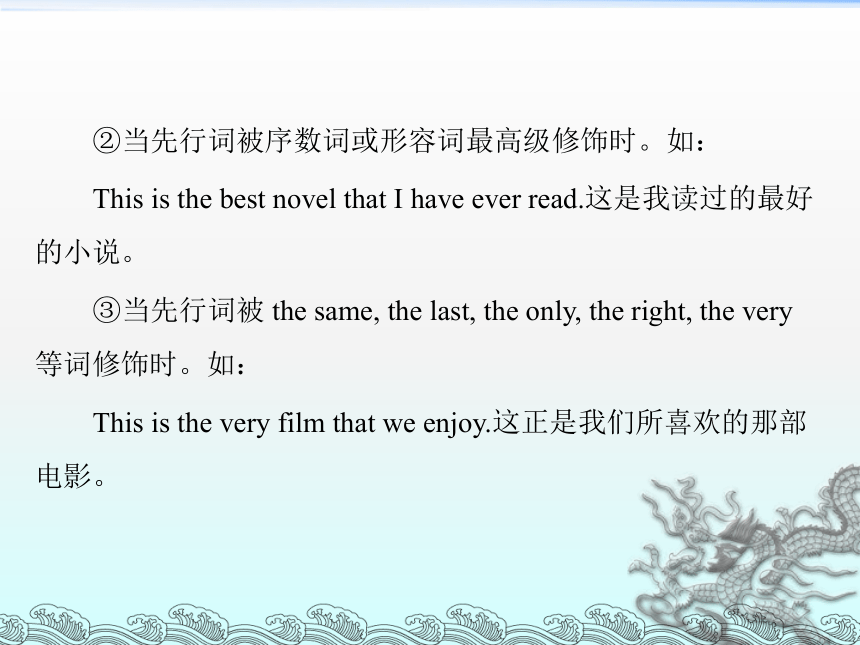
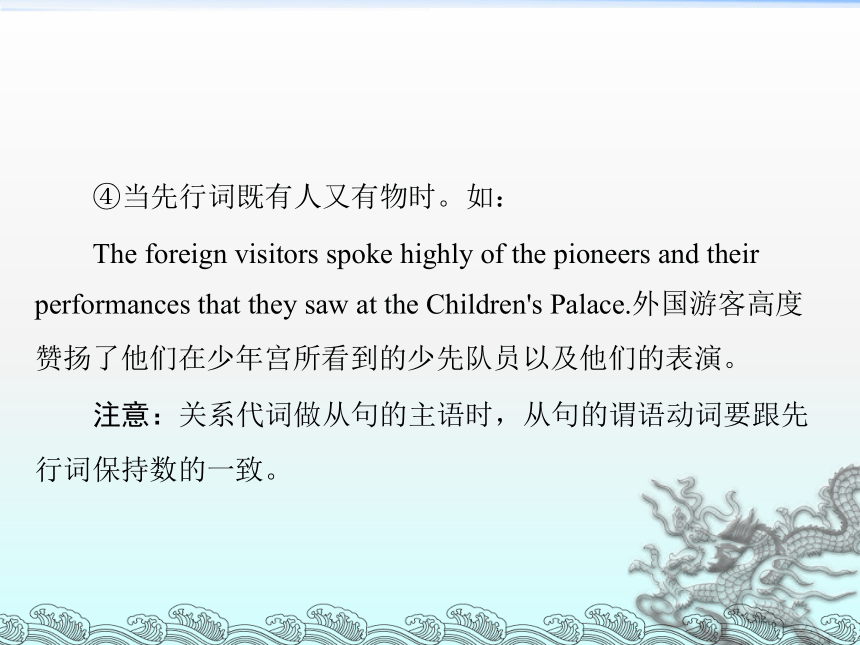
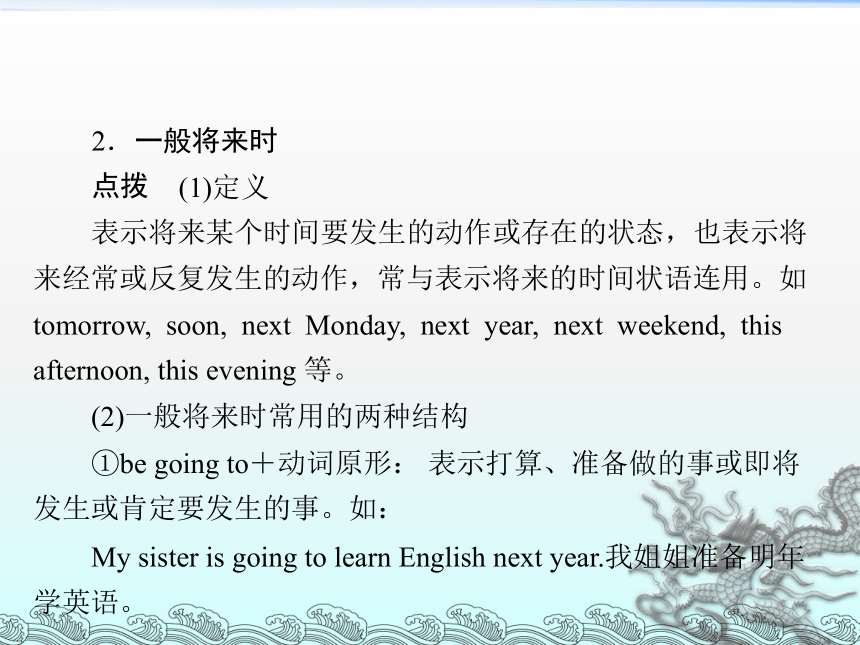
文档简介
(共14张PPT)
Unit 14
I remember meeting all of you in Grade 7.
短 语
have problems with sth.
点拨
have problems with sth.意为“在……方面有困难”,
与 have difficulty in sth.意思相同。 如:
I had problems with math last term, but I am good at it now.上
学期我在数学方面有困难,但是现在我擅长数学。
链接
表示“做……有困难”还有如下同义词组:
have trouble (in) doing
have difficulty (in)doing
have problems in doing
have a hard/difficult time (in) doing
语 法
1.定语从句
点拨
(1)定义
在复合句中,修饰某一名词或代词的从句叫定语从句。被
定语从句修饰的词叫先行词;引导定语从句的词叫关系词。如:
I love singers who write their own music.我喜欢自己写音乐
的歌手。
I like music that I can dance to.我喜欢可以跟着跳舞的音乐。
(2)用法
若先行词是人,且在从句中做主语,关系词用 who 或 that;
做宾语时,可用 whom 或 that,且常可省略。若先行词为物,
且在从句中做主语或宾语,关系词用 which 或 that;做宾语时
可省略。whose 既可指人又可指物,在从句中做定语。
(3)只能用 that,不能用 who 或 which 引导定语从句的情况
①当先行词为 none, little, all, much, everything, anything 等
不定代词,或先行词被不定代词修饰时。如:
Is there anything else that you require?你还需要一些其他的
什么东西吗?
②当先行词被序数词或形容词最高级修饰时。如:
This is the best novel that I have ever read.这是我读过的最好
的小说。
③当先行词被 the same, the last, the only, the right, the very
等词修饰时。如:
This is the very film that we enjoy.这正是我们所喜欢的那部
电影。
④当先行词既有人又有物时。如:
The foreign visitors spoke highly of the pioneers and their
performances that they saw at the Children's Palace.外国游客高度
赞扬了他们在少年宫所看到的少先队员以及他们的表演。
注意:关系代词做从句的主语时,从句的谓语动词要跟先
行词保持数的一致。
2.一般将来时
点拨
(1)定义
表示将来某个时间要发生的动作或存在的状态,也表示将
来经常或反复发生的动作,常与表示将来的时间状语连用。如
tomorrow, soon, next Monday, next year, next weekend, this
afternoon, this evening 等。
(2)一般将来时常用的两种结构
①be going to+动词原形: 表示打算、准备做的事或即将
发生或肯定要发生的事。如:
My sister is going to learn English next year.我姐姐准备明年
学英语。
②shall/will+动词原形:表示将要发生的动作或情况,没
有太多的计划性, 还用来表示意愿。如:
Shall we visit Granny Li next week 下周我们去拜访李奶
奶好吗?
3.一般现在时
点拨
(1)定义
一般现在时表示经常、习惯性的动作或者存在的状态。
(2)一般现在时的两种构成形式
①Be 型:句子的谓语动词是 be (am,is, are)。 如:
I'm a teacher, and she is a lawyer.我是个老师,她是个律师。
②实义动词型:句中的谓语动词用动词原形表示,若主语
是第三人称单数,则用动词的第三人称单数形式。如:
My sister likes sports very much.我妹妹非常喜欢运动。
(3)用法
常与表示频率的时间状语连用,如 always, usually, often,
sometimes等;当然,还有every 一族,如every day, every morning,
every Sunday 等。除此之外,还有 on Sundays, on Mondays 等等。
①陈述当前的一个事实。如:
My mother is a doctor.我妈妈是一名医生。
②表示客观事实、普遍的真理。如:
The earth is smaller than the sun.地球比太阳小。
③表示一种自然现象。如:
Days are long in summer.在夏天,白天很长。
4.般过去时
点拨
(1)定义
一般过去时表示过去经常或偶然发生的动作或存在的状态。
(2)一般过去时的两种构成形式
①Be 型
肯定句:主语+was/were+表语。如:
I was late yesterday.昨天我迟到了。
否定句:主语+was/were+not+表语。如:
We weren't late yesterday.我们昨天没迟到。
一般疑问句:Was/Were+主语+表语。如:
Were you ill yesterday?你昨天病了吗?
肯定回答: Yes, I was.是的,我病了。
否定回答: No, I wasn't.不,我没病。
特殊疑问句: 特殊疑问词+was/were+主语+表语。如:
When were you born?你是什么时候出生的?
②实义动词型
肯定句:主语+动词过去式(+宾语)+其他。如:
I went home at nine o'clock yesterday.我昨天九点钟回的家。
否定句:主语+didn't +动词原形(+宾语)+其他。如:
I didn't go home yesterday.我昨天没回家。
疑问句:Did +主语+动词原形(+宾语)+其他。如:
Did you go home yesterday?你昨天回家了吗?
肯定回答:Yes, I did.是的,我回了。
否定回答:No, I didn't.不,我没回家。
特殊疑问句:特殊疑问句+did+主语+动词原形(+宾语)
+其他。如:
What did you do last night?昨晚你做了什么?
(3)一般过去时的时间状语
一般过去时常与 yesterday, last week, last month, last year,
two months ago, the day before yesterday, in 1990, in those days
等表示过去的时间状语连用。如:
I was born in 1990.我出生在 1990 年。
When did you go to the park?你是什么时候去的公园?
Unit 14
I remember meeting all of you in Grade 7.
短 语
have problems with sth.
点拨
have problems with sth.意为“在……方面有困难”,
与 have difficulty in sth.意思相同。 如:
I had problems with math last term, but I am good at it now.上
学期我在数学方面有困难,但是现在我擅长数学。
链接
表示“做……有困难”还有如下同义词组:
have trouble (in) doing
have difficulty (in)doing
have problems in doing
have a hard/difficult time (in) doing
语 法
1.定语从句
点拨
(1)定义
在复合句中,修饰某一名词或代词的从句叫定语从句。被
定语从句修饰的词叫先行词;引导定语从句的词叫关系词。如:
I love singers who write their own music.我喜欢自己写音乐
的歌手。
I like music that I can dance to.我喜欢可以跟着跳舞的音乐。
(2)用法
若先行词是人,且在从句中做主语,关系词用 who 或 that;
做宾语时,可用 whom 或 that,且常可省略。若先行词为物,
且在从句中做主语或宾语,关系词用 which 或 that;做宾语时
可省略。whose 既可指人又可指物,在从句中做定语。
(3)只能用 that,不能用 who 或 which 引导定语从句的情况
①当先行词为 none, little, all, much, everything, anything 等
不定代词,或先行词被不定代词修饰时。如:
Is there anything else that you require?你还需要一些其他的
什么东西吗?
②当先行词被序数词或形容词最高级修饰时。如:
This is the best novel that I have ever read.这是我读过的最好
的小说。
③当先行词被 the same, the last, the only, the right, the very
等词修饰时。如:
This is the very film that we enjoy.这正是我们所喜欢的那部
电影。
④当先行词既有人又有物时。如:
The foreign visitors spoke highly of the pioneers and their
performances that they saw at the Children's Palace.外国游客高度
赞扬了他们在少年宫所看到的少先队员以及他们的表演。
注意:关系代词做从句的主语时,从句的谓语动词要跟先
行词保持数的一致。
2.一般将来时
点拨
(1)定义
表示将来某个时间要发生的动作或存在的状态,也表示将
来经常或反复发生的动作,常与表示将来的时间状语连用。如
tomorrow, soon, next Monday, next year, next weekend, this
afternoon, this evening 等。
(2)一般将来时常用的两种结构
①be going to+动词原形: 表示打算、准备做的事或即将
发生或肯定要发生的事。如:
My sister is going to learn English next year.我姐姐准备明年
学英语。
②shall/will+动词原形:表示将要发生的动作或情况,没
有太多的计划性, 还用来表示意愿。如:
Shall we visit Granny Li next week 下周我们去拜访李奶
奶好吗?
3.一般现在时
点拨
(1)定义
一般现在时表示经常、习惯性的动作或者存在的状态。
(2)一般现在时的两种构成形式
①Be 型:句子的谓语动词是 be (am,is, are)。 如:
I'm a teacher, and she is a lawyer.我是个老师,她是个律师。
②实义动词型:句中的谓语动词用动词原形表示,若主语
是第三人称单数,则用动词的第三人称单数形式。如:
My sister likes sports very much.我妹妹非常喜欢运动。
(3)用法
常与表示频率的时间状语连用,如 always, usually, often,
sometimes等;当然,还有every 一族,如every day, every morning,
every Sunday 等。除此之外,还有 on Sundays, on Mondays 等等。
①陈述当前的一个事实。如:
My mother is a doctor.我妈妈是一名医生。
②表示客观事实、普遍的真理。如:
The earth is smaller than the sun.地球比太阳小。
③表示一种自然现象。如:
Days are long in summer.在夏天,白天很长。
4.般过去时
点拨
(1)定义
一般过去时表示过去经常或偶然发生的动作或存在的状态。
(2)一般过去时的两种构成形式
①Be 型
肯定句:主语+was/were+表语。如:
I was late yesterday.昨天我迟到了。
否定句:主语+was/were+not+表语。如:
We weren't late yesterday.我们昨天没迟到。
一般疑问句:Was/Were+主语+表语。如:
Were you ill yesterday?你昨天病了吗?
肯定回答: Yes, I was.是的,我病了。
否定回答: No, I wasn't.不,我没病。
特殊疑问句: 特殊疑问词+was/were+主语+表语。如:
When were you born?你是什么时候出生的?
②实义动词型
肯定句:主语+动词过去式(+宾语)+其他。如:
I went home at nine o'clock yesterday.我昨天九点钟回的家。
否定句:主语+didn't +动词原形(+宾语)+其他。如:
I didn't go home yesterday.我昨天没回家。
疑问句:Did +主语+动词原形(+宾语)+其他。如:
Did you go home yesterday?你昨天回家了吗?
肯定回答:Yes, I did.是的,我回了。
否定回答:No, I didn't.不,我没回家。
特殊疑问句:特殊疑问句+did+主语+动词原形(+宾语)
+其他。如:
What did you do last night?昨晚你做了什么?
(3)一般过去时的时间状语
一般过去时常与 yesterday, last week, last month, last year,
two months ago, the day before yesterday, in 1990, in those days
等表示过去的时间状语连用。如:
I was born in 1990.我出生在 1990 年。
When did you go to the park?你是什么时候去的公园?
同课章节目录
- Unit 1 How can we become good learners.
- Section A
- Section B
- Unit 2 I think that mooncakes are delicious!
- Section A
- Section B
- Unit 3 Could you please tell me where the restroom
- Section A
- Section B
- Unit 4 I used to be afraid of the dark.
- Section A
- Section B
- Unit 5 What are the shirts made of?
- Section A
- Section B
- Review of Units 1-5
- Unit 6 When was it invented?
- Section A
- Section B
- Unit 7 Teenagers should be allowed to choose their
- Section A
- Section B
- Unit 8 It must belong to Carla.
- Section A
- Section B
- Unit 9 I like music that I can dance to.
- Section A
- Section B
- Unit 10 You're supposed to shake hands.
- Section A
- Section B
- Review of Units 6-10
- Unit 11 Sad movies make me cry.
- Section A
- Section B
- Unit 12 Life is full of the unexpected
- Section A
- Section B
- Unit 13 We're trying to save the earth!
- Section A
- Section B
- Unit 14 I remember meeting all of you in Grade 7.
- Section A
- Section B
- Review of Units 11-14
